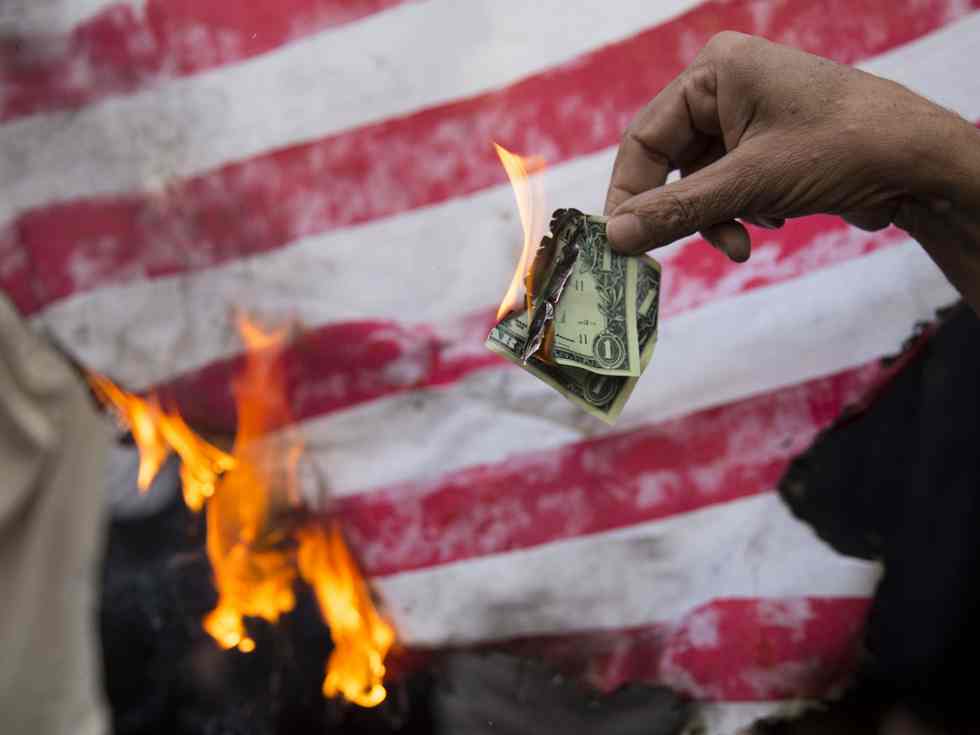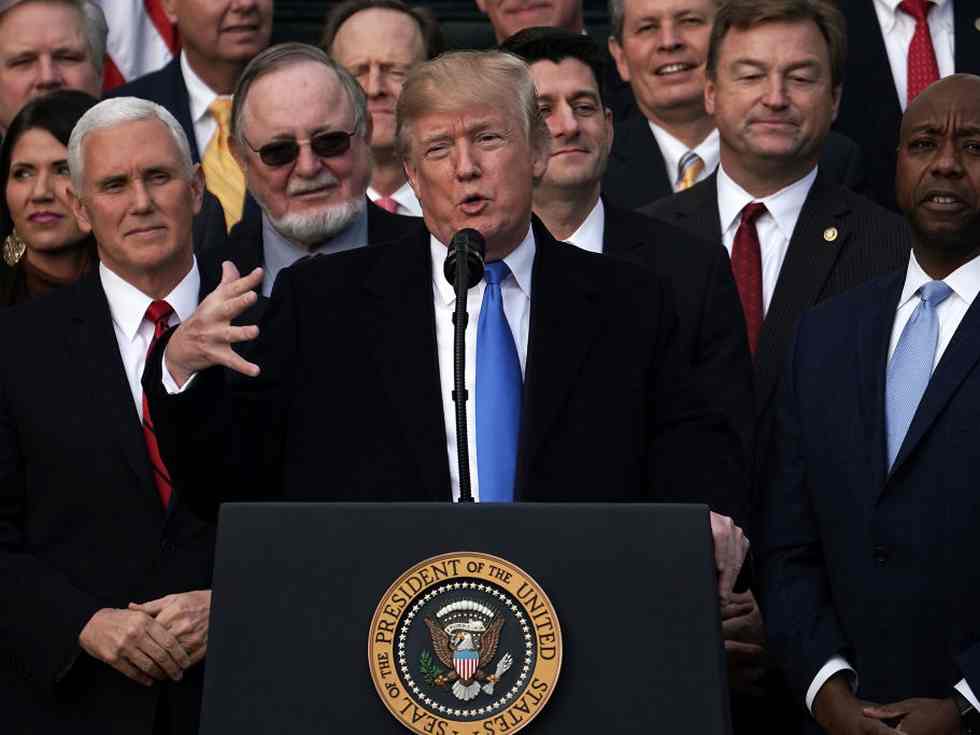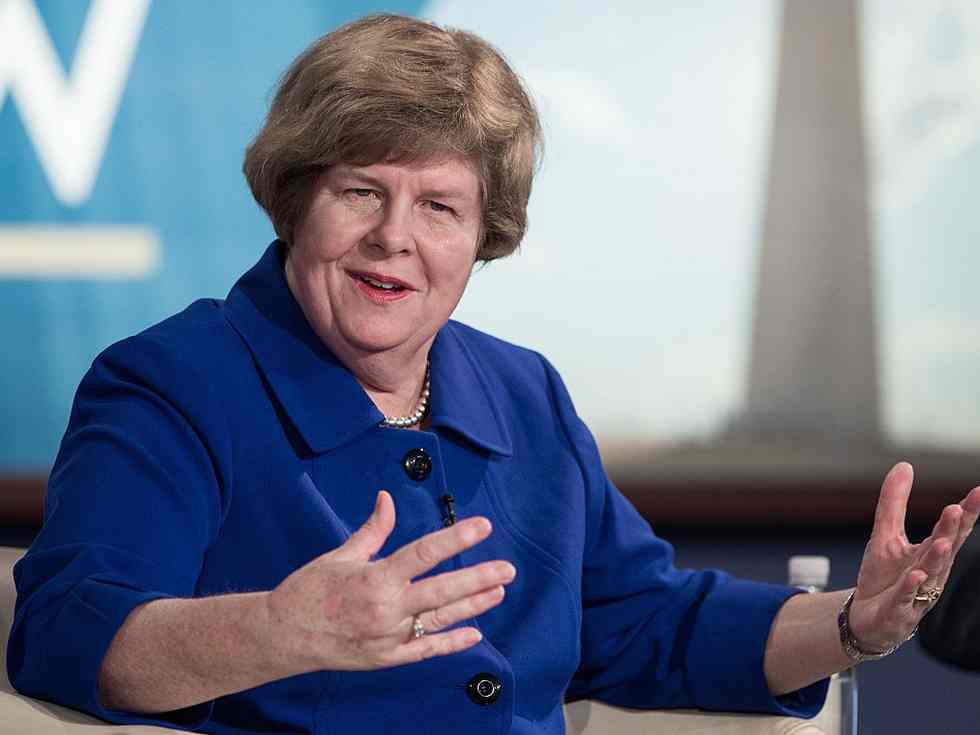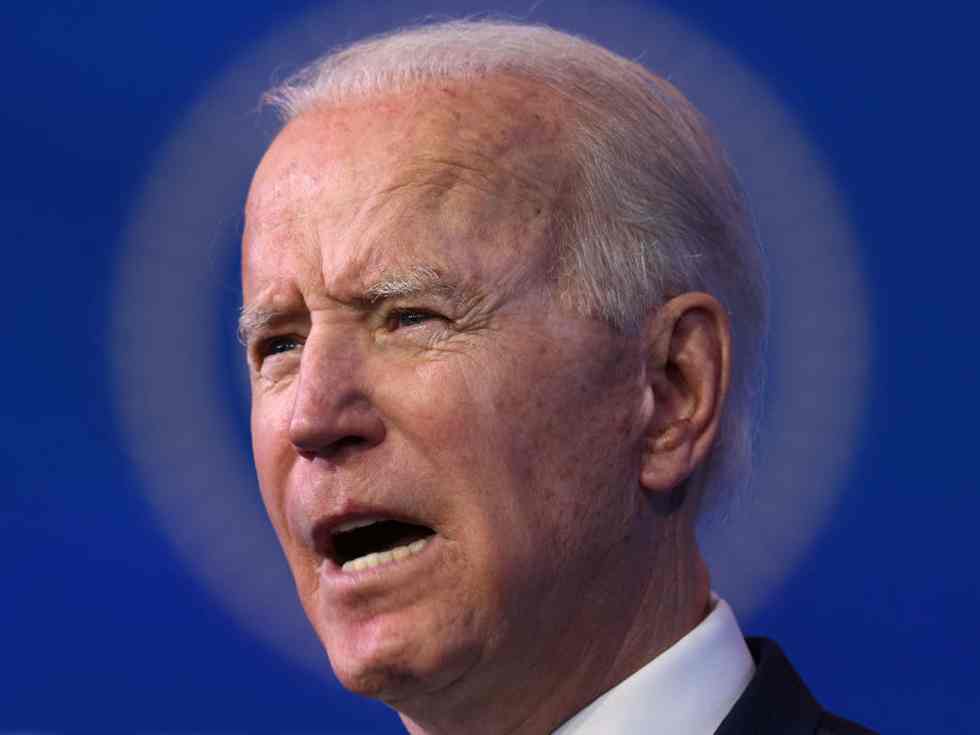Sanctions Are Destroying U.S. Greenback’s Standing as World’s Prime Forex

The USA’ reliance on financial sanctions to coerce different international locations is regularly shedding its effectiveness and slowly degrading considered one of Washington’s most influential instruments in worldwide affairs, the ability of the U.S. greenback, specialists advised Newsweek.
The buck stands in a category of its personal as the most well-liked and strong forex throughout the worldwide banking system, outsizing its subsequent largest competitor, the euro, a by an element of almost three to at least one.
On the subject of currencies, the greenback is by far the world’s most secure greatest.
However this may very well be altering.
The continuous use of sanctions to strain international locations and firms perceived to be appearing in opposition to U.S. pursuits may be weakening the greenback’s world place.
“It is definitely not an imminent risk to the dominance of the greenback, however it’s by far the largest one,” Benn Steil, senior fellow and director of worldwide economics on the Council on International Relations, advised Newsweek.
In a time of main market disruptions as a result of world pandemic, Steil used a medical instance as an instance how the overuse of sanctions is definitely making the illness worse.
“Antibiotics might be very highly effective in opposition to sure forms of micro organism,”Steil mentioned, “however as you realize, when you overuse them on a inhabitants, strains of the micro organism develop which might be immune to the antibiotic. And that is precisely what we’re seeing now.”
Whilst quite a lot of specialists sound the alarm, the tantalizing comfort of merely prescribing these financial restrictions as a one-fits-all remedy is shedding its impact, and on the similar time, empowering the opposition.
“Whenever you use this specific software to the extent that we’re utilizing it,” Steil mentioned, “you may count on that it turns into an increasing number of cost-effective for the international locations which might be affected to search for options.”
Whereas the greenback is more likely to stay the forex of selection on this planet banking system for a while, these options are multiplying and bettering as Washington’s peerless place is more and more questioned by pals and foes alike.
The U.S. follow of boycotting adversaries dates again centuries, however the wholesale use of such measures coincides with the rise of the greenback because the world’s reserve forex within the last years of World Warfare II. The battle imposed a devastating toll on the previous colonial powers of Europe and paved the trail for a brand new financial empire to rise—unbridled U.S. capitalism.
Washington’s literal money-making machine would outlast its high rival, the Soviet Union, and launch it into a brand new period of financial supremacy via the flip of the twenty first century.
At this time, the greenback accounts for round 60% of overseas alternate reserves, simply topping the euro’s estimated 21% and dwarfing the Japanese yen (6%), the British pound sterling (4.7%) and different currencies within the single digits, in line with the newest figures from the Worldwide Financial Fund.
However the U.S. will not be unmatched in all financial measures. China is on a quick observe to grow to be the world’s largest economic system, whilst its forex is available in at roughly solely 2.25% of overseas alternate reserves. Coinciding with Beijing’s rise is an onslaught of recent sanctions from Washington focusing on the Folks’s Republic for a laundry listing of alleged human rights abuses.
As has been the case with different targets of U.S. sanctions, nonetheless, specialists are unsure as as to if such measures really contribute to what Washington would see as constructive adjustments within the conduct of the supposed goal.
Unique: China’s Ambition to Be Well being Superpower Has Enhance from PandemicRead extra
Unique: China’s Ambition to Be Well being Superpower Has Enhance from Pandemic
However there isn’t a such uncertainty about one impact of these sanctions: They hurt their goal. Steil says that alone shouldn’t be confused for a decisive victory.
“We frequently select to mistake different international locations’ ache for attaining our intention,” Steil mentioned. “In different phrases, after we impose monetary sanctions on different international locations, it is normally to alter their overseas coverage. However within the overwhelming majority of circumstances they do not really do this.”
The ache is felt principally by civilian populations, particularly in blacklisted international locations like Cuba, Iran, North Korea, Syria and Venezuela. Although sanctions have received political factors at residence for U.S. administrations, that is little proof that the focused international locations shifted or deserted undesirable insurance policies of governments in response to the financial coercion.
As a substitute, the U.S. has seen main strategic opponents China and Russia, and even allies and companions like Turkey and India, more and more swing their financial weight within the path of buying and selling of their respective nationwide currencies when it fits their pursuits. The greenback stays on high, however international locations are starting to query the diploma to which U.S. monetary establishments function intermediaries—or gatekeepers—for worldwide banking.
“The U.S., by repeatedly utilizing sanctions, is starting to chop off its nostril to spite its face,” Anuradha Chenoy, previously the dean of Jawaharlal Nehru College’s College of
Worldwide Research in New Delhi, advised Newsweek. “Historical past has repeatedly proven that sanctions don’t impression energy elites and the ruling regimes. Their impression is felt by peculiar individuals and extra so by professional companies.”
As different international locations more and more wield their very own monetary clout, she argued that it’s time the U.S. rethinks its method.
“The U.S. first proposed globalization,” Chenoy added. “China and others have gotten deeply built-in into the worldwide economic system. No simple reversal is feasible. The U.S. ought to come to phrases with this globalized actuality and re-examine its sanctions regime.”
She mentioned the motion has gone largely unnoticed within the Eurocentric world, however seismic shifts are occurring in different stretches of the globe.
Chenoy factors to establishments such because the New Growth Financial institution established by the BRICS (Brazil, Russia, India, China, South Africa) group, the Beijing-based Asian Infrastructure Funding Financial institution, the Shanghai Cooperation Group and the Russia-led Eurasian Financial Union, which is linked carefully to China’s Belt and Highway Initiative, a worldwide sequence of funding and infrastructure tasks involving up 140 international locations.
The widespread denominator right here is China, simply considered one of quite a lot of nations that Henrietta Worthington, a counsel specializing in worldwide monetary affairs on the Pillsbury Winthrop Shaw Pittman legislation agency, mentioned has, for years, “been making an attempt to scale back their reliance on the USD, which is the dominant forex used to settle commerce throughout the globe.”
China already seems to be main the way in which within the rise of a courageous new mannequin of currencies: digital yuan. Plenty of international locations are eyeing comparable rollouts, however the state-backed Folks’s Financial institution of China is about on institutionalizing the brand new digital banknote on an formidable scale and timetable.
The endeavor might supply an avenue to keep away from a U.S.-led banking system if the mission is carried via in full.
“There was an increase within the improvement of funds methods along with the expansion of digital currencies, which can pose a risk to the autonomy of the USD,” Worthington advised Newsweek. “Specifically, China is creating a digital yuan that’s backed by China’s central financial institution, and which may very well be set to rival the USD as a option to settle commerce.”
Goldman Sachs has predicted that the digital yuan might attain 1 billion customers over the course of the subsequent decade, a improvement Worthington mentioned “might threaten the established position of the USD because the world’s reserve forex.”
Will the U.S. Greenback Lose Its Place because the World’s No. 1 Reserve Forex?Learn extra
Will the U.S. Greenback Lose Its Place because the World’s No. 1 Reserve Forex?
Former President Donald Trump set out an aggressive method towards China, and although his successor, Joe Biden, has left the door open for sure areas of cooperation, the brand new management has indicated it too would battle to stay on the helm of world affairs.
Worthington notes that the sanctions slapped on Beijing in simply the early months of the Biden administration sign that “using sanctions as a coercive financial measure continues to be an necessary software in U.S. overseas coverage.”
However the digital yuan and the bodily renminbi would have an extended option to go earlier than dethroning the U.S. greenback. The truth is, China contributes to the greenback’s standing by having extra of it than another nation in its unmatched, multitrillion greenback overseas reserves and its unclear that Beijing even sought to have its closely-regulated forex go world to the extent that the greenback has.
“China can also be a serious overseas holder of the debt, however their means (and willingness) to drop that debt is restricted,” Paul Poast, an affiliate professor on the College of Chicago’s Division of Political Science, advised Newsweek. “Consider the previous phrase, ‘Owe the financial institution $500, it is your drawback. Owe the financial institution $5 million and it is the financial institution’s drawback.'”
And whereas U.S. resistance to China’s rise might turn into a contributing issue weakening Washington’s maintain on the world monetary system, it has made different controversial strikes that gas this projection as properly.
Poast mentioned a lot of the U.S. greenback’s power and stability lies in its ongoing reputation amongst companions and allies. Prime European powers like France, Germany and the UK, have lengthy tolerated Washington’s post-World Warfare II hegemony over world funds.
However a turning pointing got here three years in the past.
In Might 2018, Trump pulled out of the Joint Complete Plan of Motion (JCPOA), the painstakingly negotiated nuclear deal signed in 2015 by China, France, Germany, Iran, Russia, the UK and the U.S. The settlement lifted worldwide sanctions on Tehran in alternate for tight restrictions on its nuclear program. However the U.S. exit was adopted by new unilateral constraints, that—as a result of U.S. centrality in worldwide finance—minimize off burgeoning Western commerce as properly.
Europe issued a uncommon revolt, selecting to stay within the settlement, although in actuality little commerce was carried out with Iran as a result of intractable job of making an attempt to keep away from triggering U.S. blowback. Whereas Biden has signaled a need to return to the JCPOA, sanctions stay in place, and the consequences of Washington’s withdrawal stay in current reminiscence.
“I believe that there was a recognition that these instruments may very well be overused or exploited,” Aaron Arnold, affiliate director of the Venture on Managing the Atom at Harvard College’s Belfer Heart, advised Newsweek.
The euro, a forex as soon as eulogized by many within the wake of the 2007 monetary disaster, has confirmed itself a high contender for a reserve forex. If it have been to ascend to the highest spot, this is able to sign a considerable transatlantic reclamation.
Previous to the rise of the U.S. greenback, in style reserve currencies courting again centuries included these of Portugal, Spain, the Netherlands, France and, lastly, the UK. The U.Okay.’s protracted divorce from the European Union additionally raised fears of a euro tumble, however these anxieties have but to grow to be actuality.
And whereas the EU additionally employs sanctions as a frequent instrument of statecraft, the JCPOA expertise and different incidents have made member states cautious of how Washington interprets its jurisdiction on a world scale. That is more likely to be a serious speaking level because the Biden administration strives to fix U.S.-European alliances that grew to become strained underneath the earlier White Home.
In the meantime, together with a variety of sanctions-hit states, China and Russia are coalescing underneath the banner of non-interference within the home affairs of different states, typically referred to easily as “sovereignty,” a U.N. Constitution precept they really feel has been eroded underneath a U.S.-led world order.
The extra Washington makes an attempt to dam these international locations, the extra resourceful they’ll possible grow to be, and the extra possible they are going to be to cooperate with one another to thwart U.S. efforts.
“The U.S. has taken a extra extraterritorial method, leveraging some novel points of its home laws, to implement its sanctions regimes,” Arnold mentioned. “And so, I believe different international locations have seen this as clearly an incursion on sovereignty, and a few international locations have basically moved to type of buffer from that kind of extra-territorialism.”
Regardless of this resistance, nonetheless, belief within the U.S. greenback stays excessive, and to this point it has weathered a slew of economic crises, together with the COVID-19 pandemic. That being mentioned, like just about all currencies, it is solely definitely worth the quantity persons are prepared to imagine in it, and overconfidence might function a blind spot to policymakers not paying shut consideration ought to the winds shift.
In the event that they do, Arnold warned it’ll include little or no warning.
“You would not essentially see a decline in using greenback. It might occur comparatively rapidly,” Arnold advised Newsweek. “So I take that to imply that we would not essentially be capable to predict, with quite a lot of confidence, that there is a important or a consequential transfer away from the greenback.”
“Traditionally,” he mentioned, “we would not know till it occurs.”






